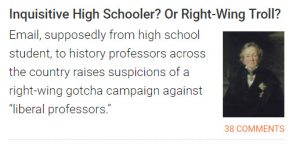Inside Higher Ed ran a very strange article today that says more about the historians involved than the details of the story.
First the actual event that happened:
Over the last few days, a person claiming to be a high school student sent out a mass-email to a bunch of history professors. The email asked them to fill out some sort of questionnaire about a claim by 19th century German historian Leopold von Ranke on objectivity in history. It then directed the reader to a link on SurveyMonkey.
That’s it.
There was no discernible pattern to the email, other than it appears to have gone to lists of recipients copied off of a variety of history department webpages. Its purpose was – and remains – unclear. It could be a phishing scam or it could be a simple survey by some random oddball who’s interested in von Ranke. In any case though, the email’s text was entirely ignore-able – as in the sort of thing that usually goes straight to the spam folder, along with requests to submit to pay-for-play web journals and invitations to spend $10,000 attending some “interdisciplinary management sciences” conference on a Greek island. The normal response to that sort of thing is most likely hitting the delete button and going about one’s day.
But somebody didn’t hit the delete button on this one. L.D. Burnett, a Teaching Fellow at the University of Texas-Dallas, decided to write a blog post about it in which she strongly intimated her suspicions that the anonymous von Ranke spammer was actually an elaborate scheme concocted by right-wing media outlets to entrap her and other “progressive” historians into saying something inelegant about their chosen profession.
Note that Burnett did not have any evidence for this charge of right-wing mischief – only a deletion-worthy spam email about a long-dead German historian that only a small number of specialists study in depth. She nonetheless speculated that it might have been a trap laid for her by Campus Reform, and almost certainly “a dude, despite the feminine nym on the email.” Burnett’s speculative exercise quickly migrated over to the facebook group of the Society for U.S. Intellectual History. Here she appended her unfounded claims about Campus Reform with an additional suggestion implicating the right-wing tabloid site Breitbart news. Other historians quickly chimed in, spinning their own elaborate theories about how the von Ranke spammer showed tell-tale signs of video provocateur James O’Keefe, who released a recording earlier in the day targeting a New York Times reporter.
Within short order a full-fledged conspiracy was born. And then Inside Higher Ed turned it into a news story about a supposed “right wing troll” who might be targeting historians.
To briefly recap this madness, what started as a random deposit in a spam box quickly morphed into an elaborate right-wing conspiracy theory where it was echoed by multiple academic historians and written up in the press. This all happened despite there being exactly zero evidence to support the original claim on Burnett’s blog and the places it was repeated.
It’s enough to make one seriously wonder about the overall intellectual health of the profession. While spam and phishing scams should certainly be treated with caution if for no other reason than the risk of virus infections or identity theft, the fact that Burnett’s immediate instinct was to imagine an elaborate right-wing entrapment plot suggests that ideologically-driven paranoia has found a welcome home in some sectors of the academy.
